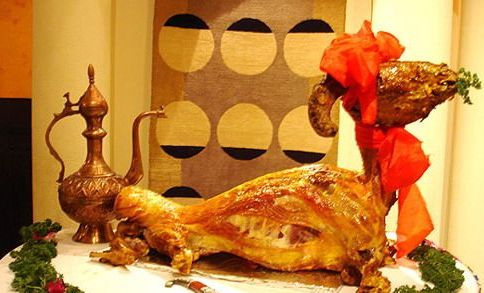Wow! That's amazing!
哇,令人驚訝的作品
Wow!
哇
That's great! It looks so ceremonial.
太好了,看起來(lái)真有節(jié)慶氣氛
After a few embellishments,
放了幾個(gè)裝飾品之后
the lamb is ready to go to the new year's feast.
整頭羊就會(huì)被放到節(jié)慶儀式中去
Noruz is the most important date on the Uyghur calendar,
諾魯孜節(jié)對(duì)維族人來(lái)說(shuō)是很重要的節(jié)日
so it's an honour to be able to deliver the lamb
所以能夠傳遞烤羊是一種榮耀
and my rice polo to a family celebration.
我做的手抓飯能夠進(jìn)入家庭慶典我也很榮幸

So, Ken, we go to the men, the men's party,
那么,老譚,我們?nèi)ツ校腥藗兊膽c典嗎
and, Ching, you go to the ladies' party here.
瀞億,你要去女士的慶典哦
Oh, OK, so it's separate. It's separate.
喔,好的,是分開(kāi)的嗎,是分開(kāi)的
OK. Well that's nice, isn't it? But that's their culture.
嗯,這也很好,不是嗎,這是他們的文化
So it's something I'm not used to.
只是我不太習(xí)慣罷了
So is this a tradition that men and women eat separately?
男女分食是傳統(tǒng)留下來(lái)的嗎
Yes, that's one of our traditions Is that every day, or...?
是的,這是我們的傳統(tǒng)之一,每天都這樣,還是
No, once a year.
不不,一年一次的
Once a year? Other times they eat together?
一年一次,其他時(shí)候他們都在一起吃飯嗎
They eat together, yes.
是的,在一起
OK, so how will the women have the lamb?
好吧,婦女們要怎么進(jìn)食羊肉呢
They bring some big plates, and just take it to the ladies' part.
他們會(huì)拿一些大盤(pán)子過(guò)來(lái),然后盛過(guò)去
All the food today was made by all the women, by all, uh,
今天的食物全是由女性,嗯
her mum-in-law's family, and the sisters, they don't question,
她的婆婆家做,還有她的姐姐,她們也不會(huì)提出質(zhì)疑
you know, that's the way they have lived for many, many years.
你懂的,她們這樣過(guò)了一年又一年
I'd like to wish them all a very prosperous new year!
我要祝他們新年行大運(yùn)











